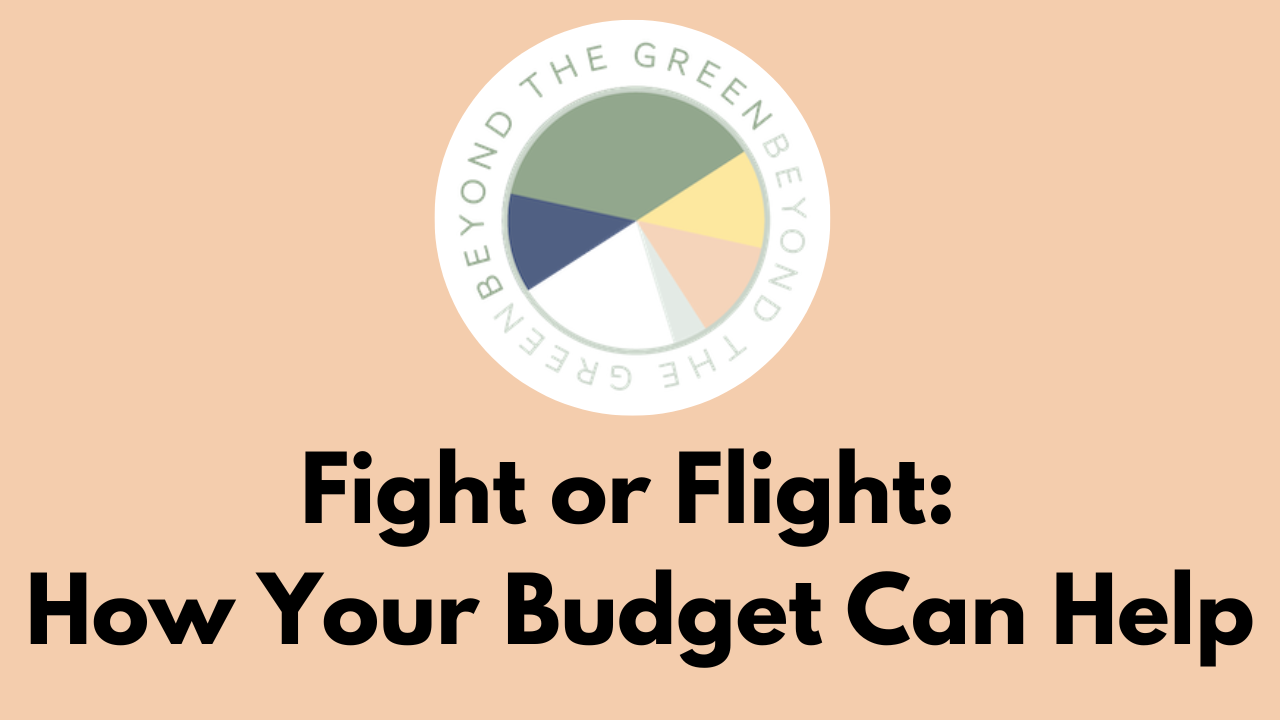Fight or Flight: How Your Budget Can Help
Apr 25, 2023
Fight or Flight: How Your Budget Can Help
Have you heard of "fight or flight" response?
It is a function is our sympathetic nervous system, and is activated when we perceive a threat.
Our nervous system is a truly incredible thing. It is really, really, REALLY good at helping every system in our body communicate, and regulate what’s happening inside and outside of our body. When we encounter a situation or being that could threaten our survival, our nervous system kicks into gear and gets all the systems in our body on the same page: usually, to run away from or fight the threat.
A fun fact about the human nervous system is that it was created a long long long long long time ago, it’s very very good, and…….hasn’t really changed after all that time.
Imagine yourself, wandering the earth thousands of years ago. You encounter a tiger 😱 Your sympathetic nervous system perceives a threat and:
1. Sees the tiger (I’m not safe)
2. Activates fight or flight
You are primed for action. Your pupils dilate. Your heart rate increases. You can run away from the tiger or you can fight the tiger. Boom. You are READY thanks to your nervous system.
Well, here’s the thing: your nervous system can’t realllllly tell the difference between a tiger and say, a massive bill from the hospital.
1. Sees hospital bill (I’m not safe)
2. Activate flight or fight
If your nervous system has learned to think of your bill to be a threat, it will activate flight or fight. That’s what it has learned to do to keep you safe.
The first step to healing your relationship with money is understanding and accepting your flight or fight response when dealing with stressors.
When you are able to identify these triggers, you can start to rewire your brain’s learned behavior. This is why budgeting is so much more than just having leftover money at the end of the month. A budget provides safety, security, stability, and control over your next move.
Ok; so what exactly IS a budget?
A budget is a tool that you use throughout the month to understand your real-time financial picture and support you in reaching short & long-term goals.
Let’s break it down.
A budget has 6 parts:
1) NON-NEGOTIABLES: Your fixed expenses that have consequences if you don’t pay them each month (rent, utilities, phone bill, health insurance, etc).
2) RECURRING MONTHLY EXPENSES: Some are non-negotiables, and some are not. Expenses in this section are fixed expenses that can be canceled but are high value to you (therapy, gym membership, Netflix, student loans)
** Don’t forget; debt minimums are recurring monthly expenses**
3) LIFESTYLE EXPENSES: this is ‘discretionary’ money where you designate every single aspect of your life a dollar amount. Clothing, going out, and personal care (for example) all get their own category defined at the TOP of every month (not the end).
4) DEBT REPAYMENT: This is where you create a strategic and sustainable plan to pay off high-interest debt.
5) SAVINGS: a combination of short, mid, and long-term savings accounts allocated to different goals and purposes.
6) INCOME: the final piece of your budget is your income. Without including your income, your budget is just a dream. A fairytale of numbers with no value.
If you’ve never budgeted before, we understand it can feel extremely overwhelming to just….start.
Here’s what you can do TODAY to get started with budgeting:
- Know your numbers. How much does it cost to live? How much are you spending on non-negotiables? Recurring expenses? Grab your pen (or an Excel spreadsheet if that's your vibe) and make a list. Understand how much money you are spending every month.
- Understand your income: how is your paycheck broken down into taxes? Benefits? Retirement contributions? Do you have multiple income streams? How much do you make from each one? What is the net income you’re bringing in each month (ie, after-tax money)
- Spend less than you make. This is the simplest way to start budgeting. It's not a perfect system, but it's a great start!
While budgeting isn't a great defense against tigers, it's a FANTASTIC tool for facing financial stress and feeling safe and in control, instead of activated. It can give you a plan for your next move, and systems to lean into when unexpected expenses come up (because let's be real; they're gonna). When you budget, you are reinforcing to yourself that you matter. When you prioritize your budget you prioritize yourself.
If you’re just starting your budgeting journey, we are cheering you on!!! And if you’re looking for additional support, check out our current offerings here.
Beyond The Basics: Our Glossary Of Financial Terms
We define the lingo you'll need to become a finance expert!
We hate SPAM. We will never sell your information, for any reason.


